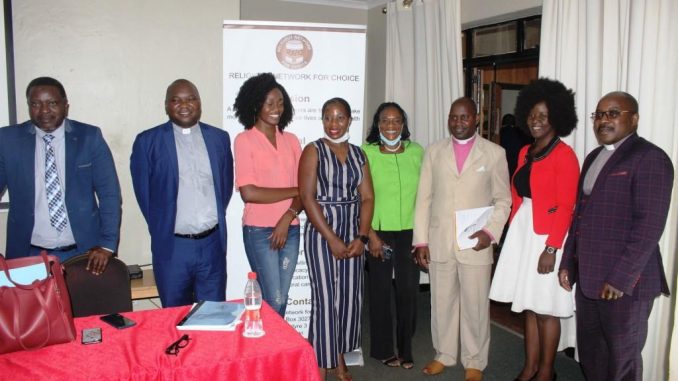
Malawi-based religious network has said there is no unanimous religious view on access to sexual and reproductive health and rights,hence the government should lead the way in legal and policy formulation as well as service delivery.
Religious Leaders Network for Choice (RLNC) chairperson Rev Martin Kalimbe told youth organisations leaders from eastern region districts of Balaka, Machinga, Mangochi and Zomba that faith groups have diverse opinions on sexual and reproductive health and rights (SRHR).
“We have religions and denominations that allow polygamy while others only accept monogamy. Some strongly oppose contraceptive use, while others have no problems with family planning methods.”
According to Kalimbe, the same applies to the issue of abortion. Some denominations oppose all forms of abortion, yet others only accept abortion on one ground – to save the pregnant woman whose life is in danger.
“There are also religious groupings and churches that allow women to access abortion in cases of rape, incest or severe fetal malformation. Some churches even look at abortion as a reproductive health issue that the pregnant woman and her doctor should deal with if necessary,” he said.
Commenting on the proposed Termination of Pregnancy Bill, Kalimbe said the government has an obligation to reduce maternal deaths in line with its own policies and international commitments.
“We, in the church, make regulations and codes that guide our members. The mandate of making laws that benefit all citizens, including believers and non-believers, lies in the hands of the government. If the government enacts the Termination of Pregnancy Bill, some will benefit, while others will not take advantage of it because of their personal, cultural and religious beliefs. That is the spirit and nature of most laws we have.”
“Alcohol consumption is not criminalised in Malawi, but it does not mean everyone drinks because there are no restrictions. These are issues that depend on individual choices,” he said.
He observed that the government has actively involved religious leaders in drafting the proposed T.O.P Bill, but expecting all of them to agree with it was unattainable.
The Special Commission that drafted the bill had Bishop Gilford Matonga representing the Malawi Council of Churches, Fr Dennis Mkomwa representing the Episcopal Conference of Malawi and Sheikh Imuran Saidi representing the Muslim Association of Malawi.
“There are issues that will have proponents and opponents. For example, the death penalty, euthanasia, abortion and alcohol consumption will always have supporters and opponents because they are divisive issues. Laws are framed to benefit both sides,” he said.
In a foreword of a Report of the Law Commission on the Review of Abortion Law, the commission admitted to having “had a difficult task before it as it was dealing with an emotive subject that attracts mixed reactions and perceptions from different quarters depending on the angle from which it is perceived, that is, from a legal, public health, moral or religious point.”
The government, through the Ministry of Health, requested the Law Commission to review abortion laws as one way of reducing pregnancy-related deaths.
Commenting on the abortion law review process, a renowned Malawian gynaecologist Dr Chisale Mhango bemoaned that misconceptions have mired the debate on the proposed Termination of Pregnancy Bill.
“The issue is not about the rights and wrongs of abortion. It is not about the sinfulness or righteousness of those who induce abortion. The debate questions should be concise. Should women continue to die from unsafe abortions when we doctors have the expertise and abilities to save them? Should we continue to let women die from pregnancy-related causes just because our country is dilly-dallying in reviewing a 1930 colonial law? That should be the debate.”
He said doctors are not concerned about the religious affiliations of their patients but their lives, health and well-being
